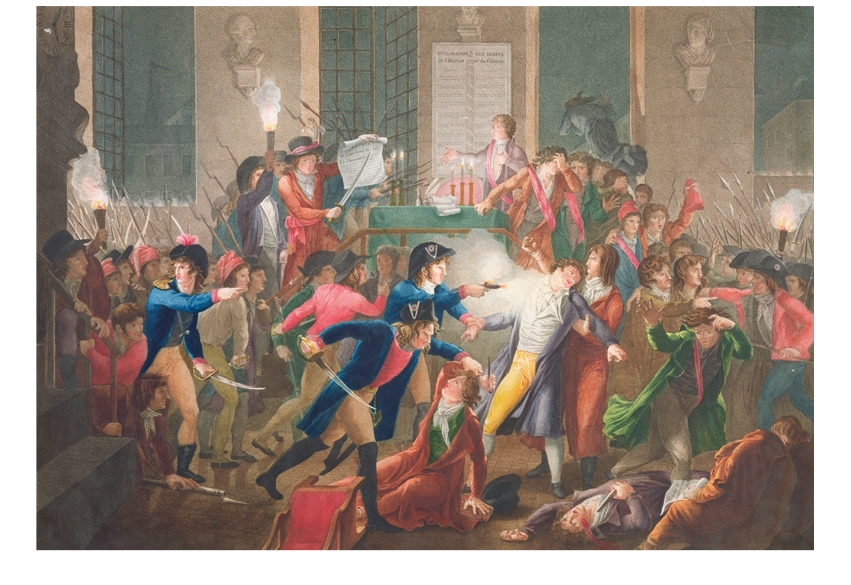The mighty convulsion that was the French Revolution has stirred the blood of historians from Thomas Carlyle to Simon Schama and consideration of it still inflames opinions. At its centre stood Maximilien Robespierre — 5’ 3”, stern, unaffacted in manner or dress, Spartan in his domestic habits — deified by his followers as the ‘Incorruptible’ and vilified by his opponents as a traitor to the ideals of 1789, bent on dictatorship. Peter McPhee spares us speculation (Robespierre left no memoirs or diaries) on his subject’s ‘inner life’. Relying chiefly on Robespierre’s voluminous speeches and articles for the press, he calmly follows his progress, from crisis to crisis, in an austere prose and at a steady pace that are somehow in keeping with his subject’s character.
Born at Arras, to the north-east of Paris, into the provincial bourgeoisie of Artois, Robespierre spent 12 years at France’s premier school, Louis-le-Grand, in Paris. There his high intelligence and industry won him golden opinions and prizes. There, too, drenched in the Roman classicists, especially Cicero, he imbibed the creed of republican virtue, while on the streets of the Latin Quarter he was introduced to the fierce pamphlet war against the scurrility and self-interestedness of the clergy and nobility, the First and Second Estates of the realm. Robespierre left Louis-le-Grand in 1781 and returned to Arras, where he made a modest income at the bar, plunged himself into the political controversies of the last days of the ancien régime and, as a colleague put it, ‘arrested the gaze of his compatriots’.
He arrived back in Paris in 1789 as a deputy to the Estates General summoned by Louis XVI. At the age of only 31, with almost no political experience and little oratorical skill, he made himself within months the most prominent spokesman of the left in the Third Estate, the uncompromising champion of the oppressed and advocate of liberty and democracy. He also showed himself to be one of the most radical, insisting, almost alone, that punishments for officers and rank and file in the army be made equal, that the law taking away the rights of family members of a convicted criminal be abolished and that the suffrage based on taxation be replaced by full manhood suffrage.
As the Revolution deepened and the gulf between the radical Mountain and the moderate Girondins widened, he remained ice-calm amidst the torrent of venomous, personal abuse directed at him. He was far from headstrong: he was brought only reluctantly to support the overthrow of the monarchy; he opposed the declaration of war against Austria in April 1792, on the ground that the infant republic was not ready for the task of exporting freedom beyond its borders; and in September of that year he spoke against the expulsion of 60 or more Girondins from the Convention.
The duty of rulers, Robespierre said in 1789, was ‘to lead men to happiness, through virtue, and to virtue through legislation’. He acknowledged that the revolutionaries were ‘embarked on a project which may be beyond human capacity’. The enduring question is whether, by prosecuting the so-called ‘Terror’ of 1793-94, he and the Committee of Public Safety betrayed that project. The question is essentially whether foreign invasion, in combination with counter-revolution at home, so imperilled the Revolution as to render executions by summary justice defensible.
An old acquaintance, who believed that Robespierre had ‘long walked the path of the most incorruptible patriotism’, concluded that ‘in a free country he is a traitor if he employs means contrary to liberty, even if it is to save the homeland’.
McPhee does not agree. He allows that, at the end, when he was physically and intellectually exhausted, Robespierre’s good judgment abandoned him. Accustomed to divide the world into good patriots and evil counter-revolutionaries, he could no longer distinguish between dissent and treason. That was a form of corruption, insidious and undetectable by the corrupted.
McPhee counts it an error not to have seen, after the defeat of the Austrians at Fleurus in June 1794, that the crisis was over and the Terror could subside. But the Terror, he also argues, was never a policy. It was a series of ‘rigorous government measures to win a civil and foreign war’, a ‘visceral and successful response to its enemies’ which ultimately bequeathed to France the great objects of the Revolution — popular sovereignty, constitutional government, legal and religious equality and the end of seigneurialism.
Even in a short biography McPhee might have explored more deeply the moral, legal and political ambiguities of the Terror. But nothing alters the fact that wars cost lives. Lincoln sent thousands of southerners to their death in a war fought to deny them the right to self-determination. The French revolutionaries fought for justice and freedom under a republic. Would the Mountain’s opponents have behaved less violently? It was a Girondin who, with the Jacobins in mind, told the Convention that it was ‘time for the traitors and slanderers to go to the scaffold’.






Comments